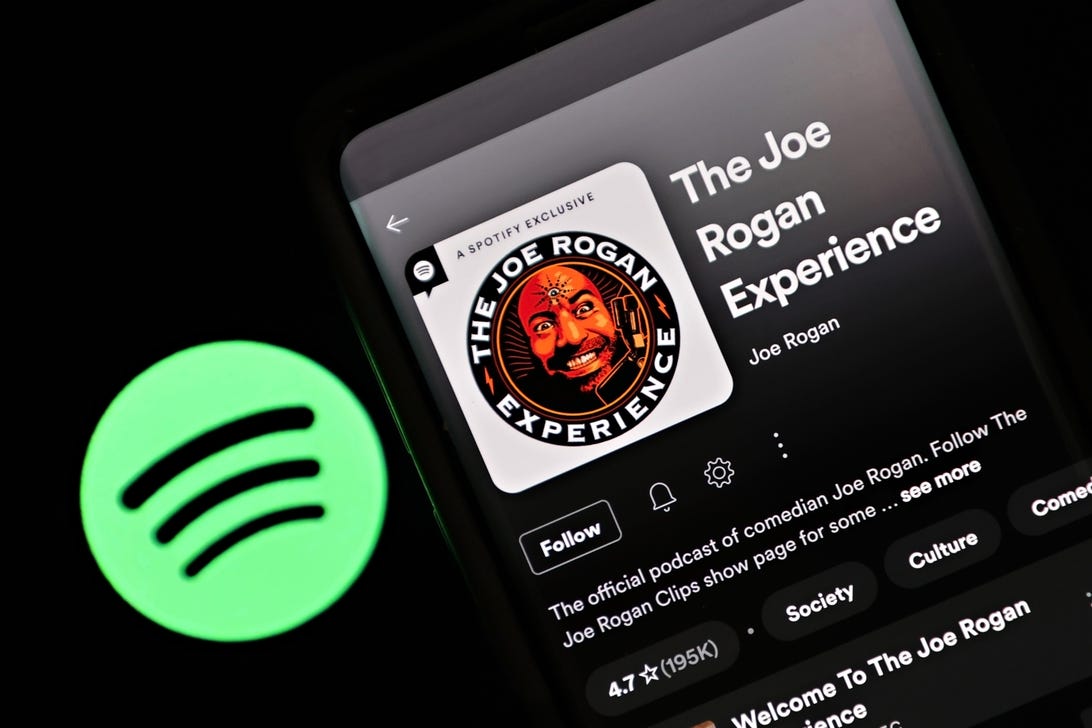
Spotify CEO Daniel Ek confirmed Sunday that Joe Rogan chose to remove multiple episodes of his popular podcast, The Joe Rogan Experience, from the streaming service after Spotify leadership’s discussed his use of “racially insensitive language,” according to a memo sent to employees.
Last week, more than 70 episodes of the podcast disappeared from Spotify after videos of Rogan using racial slurs on past shows were circulating widely on social media.
“Some of Joe Rogan’s comments [are] incredibly hurtful — I want to make clear that they do not represent the values of this company,” Ek wrote in a memo to employees, which provided Monday by a company spokeswoman. The memo was reported earlier by The Verge.
Ek went on to say that Spotify plans to invest $100 million in artists, songwriters and podcasters from “historically marginalized groups,” promising the funds would be spent on developing, licensing and marketing those creators. That dollar amount matched the value of Spotify’s 2020 licensing deal with Rogan, which made his podcast a Spotify exclusive.
The latest controversy over Rogan throws Spotify into a dilemma that Facebook, YouTube, Twitter and other internet giants have struggled to manage: walking the tightrope between freedom of expression and effective moderation of the most objectionable content on their platforms. A key difference is that Facebook’s and YouTube’s challenge is policing content at unprecedented scale; Spotify, however, is searching for a position of neutrality after investing $100 million to license a podcaster already known for courting controversy.
Rogan posted an apology on Saturday after Spotify appeared to have removed 71 podcast episodes, after videos of the comedian using racial slurs spread on social media. The events come amid a musician-led protest of the streaming service for allowing Rogan’s podcast to spread COVID-19 misinformation.
Earlier in the week, Grammy-winning singer India Arie, who has pulled her catalog from Spotify, shared on Instagram a compilation video of Rogan uttering a racial slur on numerous past episodes. The musician said Rogan shouldn’t be using such slurs under any circumstance, but acknowledged clips can be taken out of context. She also posted a message saying Rogan was problematic because of “his language around race,” as well as COVID material.
Rogan took to Instagram early Saturday to apologize. “I certainly wasn’t trying to be racist,” he said, “and I certainly would never want to offend someone for entertainment with something as stupid as racism.” Rogan agreed he shouldn’t use such slurs, regardless of the context.
Read more: Spotify won’t ax Joe Rogan till Bad Bunny or The Weeknd protests too
The apology came shortly after a fan-made website found that episodes of the podcast were no longer available on Spotify. The website, JREMissing, uses Spotify’s API to compare available episodes to a database of all episodes recorded.
Spotify has previously excluded episodes of the podcast for violating its content policies. CNET couldn’t confirm a link between the currently circulating videos and the disappearance of the episodes. Rogan didn’t respond to requests for comment.
In his apology video, Rogan says that he deleted one particular podcast episode over what he called an idiotic and racist remark he’d clumsily made. On Saturday, Bloomberg cited an anonymous source in reporting that Spotify took down dozens of episodes of the podcast after Rogan made the decision following a conversation with the company.
This new round of controversy comes amid ongoing concern that Rogan’s podcast serves as a platform for COVID misinformation. Rocker Neil Young and folk icon Joni Mitchell pulled their music from Spotify after an open letter signed by more than 250 medical professionals, researchers and professors pointed to the podcast as evidence the streaming service was promoting misinformation.
Ek has defended the inclusion of Rogan on the company’s roster and told a company town hall that the podcast was vital to Spotify’s success.
“If we want even a shot at achieving our bold ambitions, it will mean having content on Spotify that many of us may not be proud to be associated with,” Ek said during the town hall. “Not anything goes, but there will be opinions, ideas and beliefs that we disagree with strongly and even makes us angry or sad.”
